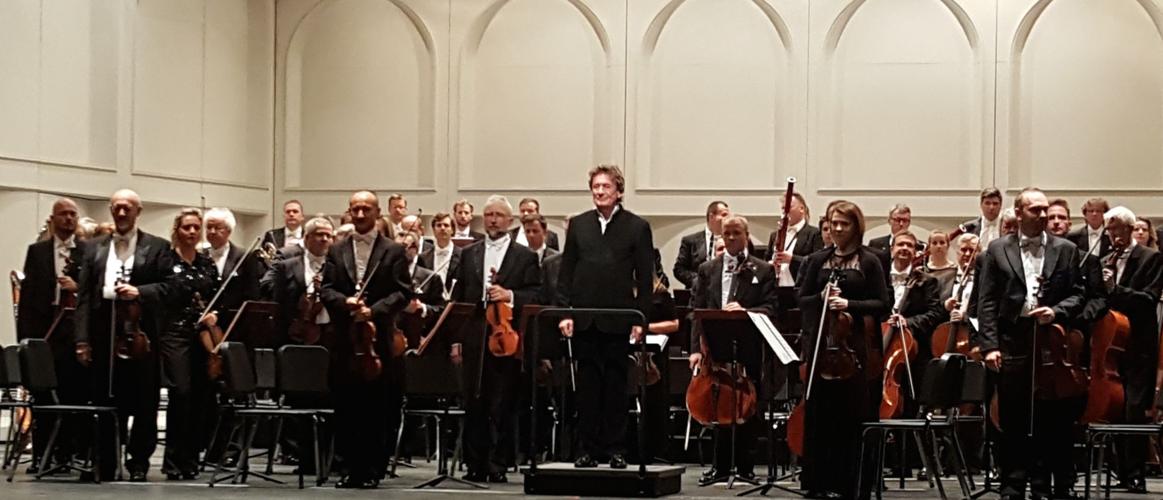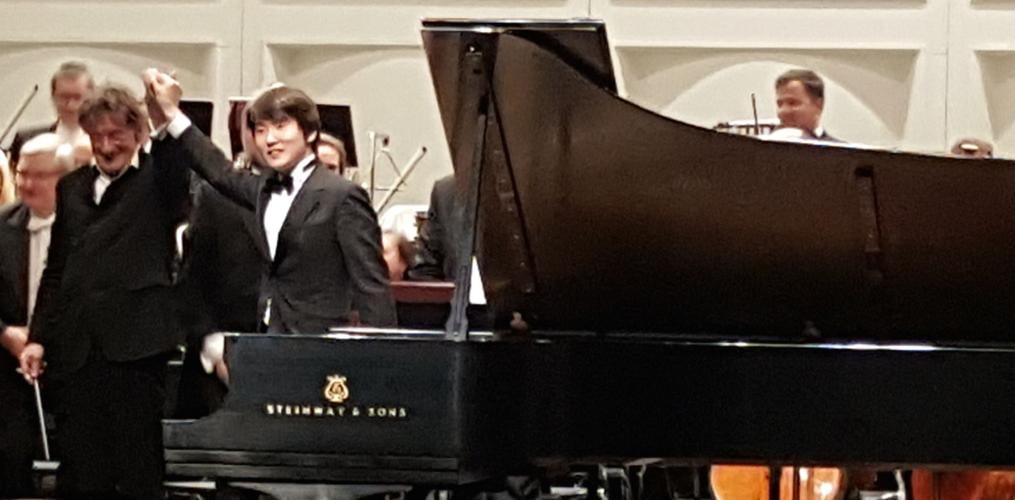We can’t say for sure, but it’s almost certain the Centennial Hall stage has never had as many musicians on it at one time as it did Wednesday night.
Ninety-five musicians from the storied Warsaw Philharmonic Orchestra, a guest pianist and conductor Jacek Kaspszyk.
Add the instruments, which included the University of Arizona’s 3-year-old Steinway & Sons concert grand piano, a giant drum tucked into the back end of the stage and a half-dozen or more basses scattered along one side behind the army of cellists, violists, wind players and violinists and it’s easy to see why the players had to scooch in to find their seats.
The result: pure sonic heaven.
There’s something about an orchestra that big with 116 years of history behind it and immeasurable talent from end to end that send shivers down your spine.
While the rest of the Tucson and the country might have been glued to Game 7 of the World Series Wednesday night, 1,200 Tucsonans were experiencing one of the world’s finest orchestras in action for the first time in our backyard since 1997 courtesy of UA Presents.
And while students outside the UA’s Main Gate were singing “Go Cubs Go” at the top of their lungs, the audience inside Centennial Hall was fighting the urge to burst into applause every time the Warsaw Phil took a breath.
From the opening piece — Weinberg’s Polish Melodies No. 2 — to the finale — Brahms’ Second Symphony — the Warsaw Phil produced a sound so gloriously big and sweet it filled in any noticeable hint of the hall’s past acoustic flaws.
Kaspszyk brought out bold shimmering strings that tempered the gentle growl of the baritone-voiced basses during the opening movement of the Brahms. Moments later, your attention was diverted to the back corner of the stage, where a trio of tuba players waited for their cue. All you could see was the pink scalp of the player on the end; the other two were shrouded by string players. The light glistened off the shiny chrome bell of the tuba player’s instrument and just as the bass melodies were dissipating, he sat up straight and he and his colleagues blew into their brass instruments, creating a glorious thump-thump that contrasted with the sweet light of the violins and cellos.
Kaspszyk paired the muscular Brahms with the bright light of his fellow countryman Weinberg, a Polish-born 20th-century composer who spent most of his professional life in Russia.
It’s likely no on in the hall Wednesday had ever heard Weinberg’s music, which is a shame. Polish Dances was a bright and feisty piece that showcased why the Warsaw Phil is a leading orchestra in the world. You could distinguish every sound, from the pizzicato strings, to the flute singing a solo and the quiet ting of the triangle in the percussion section.
Brass interludes were crystal clear and clean; there was no muddy blowback that can spoil the moment. It was so clean that your ears nearly deceived you into believing you were hearing 95 soloists.
Speaking of soloists, guest pianist Seong-Jin Cho was superb on Chopin’s First Piano Concerto.
Kaspszyk, in an interview with the Star last week, said that Cho is a rock star on the piano, and the South Korean pianist proved it Wednesday night.
He plays with technical precision and passion, yet there are moments of fluidity where he lets himself wander without going off script. He mated forceful strokes with equal gentleness in the prolonged solo parts of the second movement.
Cho might be guilty of a little showiness to his performance — the exaggerated body sway as he moved his hands from end-to-end along the keyboard producing hauntingly beautiful melodies, or the occasional hop from his piano bench at the end of a particularly powerful passage.
But he also showed off a admirable passion for the Chopin, which he performed partially with this eyes closed, his fingers finding their way by muscle memory. It was thrilling to watch and wonder just where Cho will land in the scheme of classical music superstars.
Next up on UA Presents’ classical music calendar: violin great Itzhak Perlman with Sri Lankan pianist Rohan De Sliva on Jan. 11. Visit uapresents.org for details and tickets.





